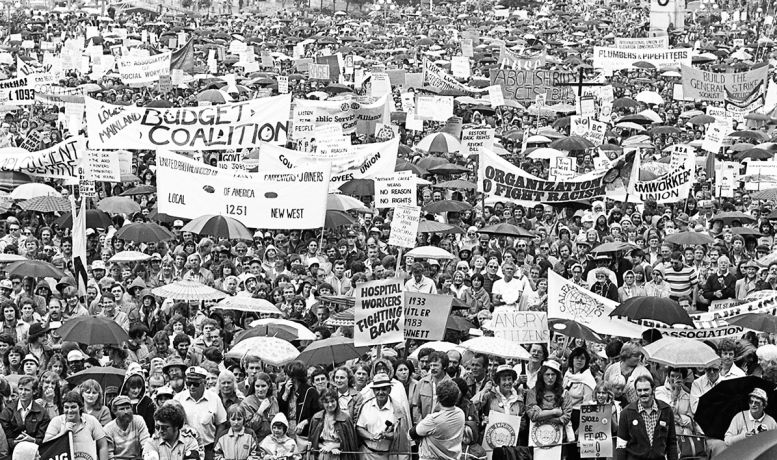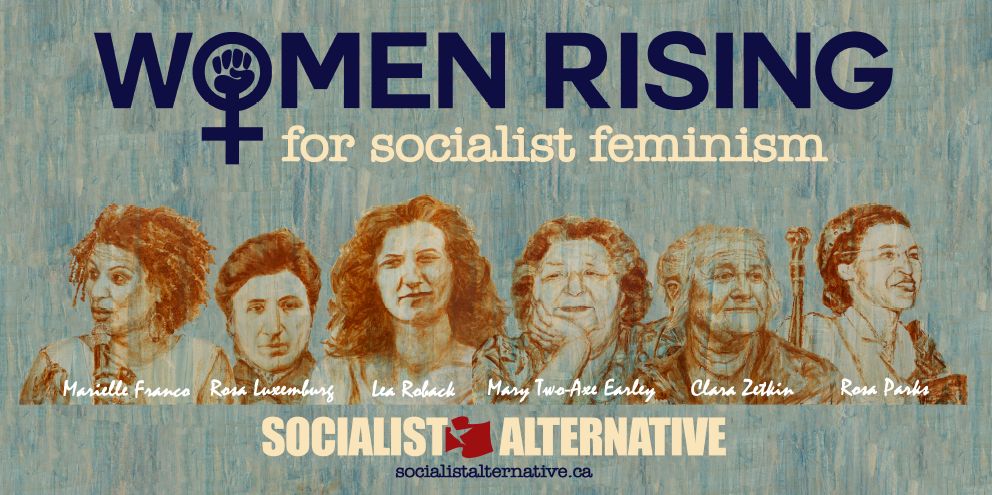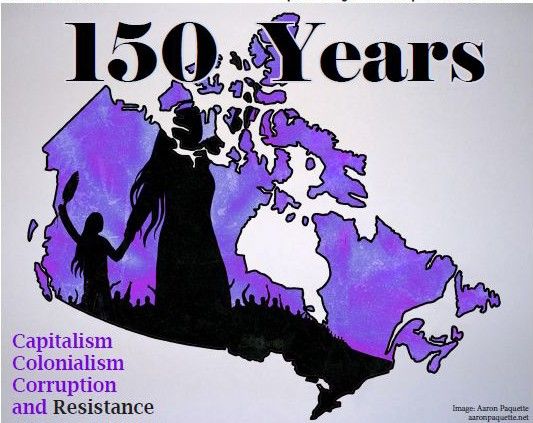Forty years ago, in the fall of 1983, BC was heading to a General Strike and then it was all called off. This was a defeat for BC’s unions and social movements, that opened the gates to cuts in public services and attacks on unions. The percentage of workers in unions has fallen more in BC than in any other province over the last 40 years, with the private sector hit the hardest.
It seemed so close. All across British Columbia that summer and fall, forty years ago now, it felt that a province-wide General Strike was at hand, and that the right-wing provincial government, and their capitalist puppet masters, were teetering, and ready to topple.
It was on July 7, 1983, that the recently and narrowly re-elected Social Credit government of Bill Bennett unleashed a torrent of neoliberal legislation, 26 bills in a single day, gutting workers’ rights, renters’ protections, and funding for social programs.
Eight days later, the union-based Operation Solidarity was born. At a convention of labour organizations, a ten-point plan and a million-dollar war chest were agreed upon. Tens of thousands demonstrated in Vancouver and Victoria, and thousands in every city and town across the province, demanding the repeal of all 26 bills. The Solidarity Coalition, representing a broad spectrum of social movements, faith groups, the unemployed, tenants and others opposing the brutal government attack, formed on August 3 with funding from Operation Solidarity. Provincial cabinet offices were occupied, and on October 15, sixty thousand marched past the Social Credit’s annual convention at the Hotel Vancouver.
That was barely two weeks before the threatened witching hour, at midnight on October 31, when the Government Employees Union contract would expire, and firings without cause would begin.
A series of escalating strikes were held, starting with 30,000 teachers. With plans afoot for dozens of other unions that would have seen at least 200,000 on strike the week of Monday, November 14, marching toward a General Strike, some on the union side of the unwieldy movement began walking on cold feet.
After secret talks between the BC Federation of Labour and the province, on the Sunday before the unfateful Monday, the Fed dispatched Jack Munro, head of the International Woodworkers of America (IWA), to negotiate one-on-one with the premier in Kelowna.
Late that night, the pair announced they had reached an agreement. The Kelowna Accord would rescind one of the 26 bills, amend another, and promise to consult on human and tenants’ rights.
And nothing else.
The Accord was never put to a vote, neither of union members, nor of Operation Solidarity or the Solidarity Coalition, but the movement was effectively over.
From the beginning, it was clear that Operation Solidarity and the Solidarity Coalition, while sharing the goal of getting all the bills rescinded, held different perspectives. Many unions were first and foremost concerned with the impact of the bills on their members, while the bills’ impact on human rights and on women, gays and lesbians and tenants were of utmost concern to the diverse members of the Coalition. A few union leaders had a broader view and were willing to strike. They understood that the entire working class, including their members’ families and friends, would be affected by the draconian measures of the government bills, but the small core of leaders at the BC Fed were dismissive of the Coalition’s concerns. They were adamantly opposed to using labour power to fight on social issues, and wanted, at all costs, to avoid a general strike that could bring down the government, with uncertain consequences, whether it was successful or not.
In the immediate aftermath, many, perhaps the majority of British Columbians, felt an enormous sense of betrayal at the hijacking of the mass movement by a few unaccountable union leaders, a sense that has echoed down the decades as one of the many divisions among the left. The sellout paved the way to further attacks on workers over the years and to the rise of neoliberalism in Canada.
But some saw a tantalizing potential in the hastily mobilized movement, as groups who previously had no contact now came to some understanding of each others’ issues. Today there appears to be hope that these connections may finally bear fruit, as a re-energized working class finds support from middle-class activists.
There are still questions to be asked, and lessons to be learned, from the events (and non-events) of 1983, so that, next time, solidarity among all workers can be maintained, both during the struggle, and after the victory.ê




